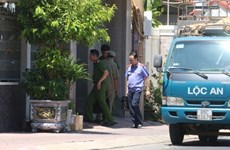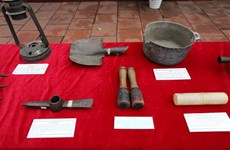Hospitals told to end queue jumping
Overloaded central hospitals have been asked to stop illegal brokers
assisting patients to jump the queue for examinations and treatment in
exchange for cash payments.
Overloaded central hospitals have been asked to stop illegal brokers
assisting patients to jump the queue for examinations and treatment in
exchange for cash payments.
Representatives of 21 hospitals in Hanoi and the health and public security ministries at a meeting on July 6 heard the problem was occurring in most central hospitals, especially those that were overloaded.
The meeting was called following newspaper reports that brokers with contacts among doctors and other medical staff were helping patients gain quicker examinations and treatment, including at the Eye, Cancer and Bach Mai hospitals.
Brokers were also receiving commissions for taking patients to private medical units for faster service, but at higher prices.
Police Social Order Investigation chief Snr Lt-Colonel Nguyen Viet Chuc said the transactions between brokers and medical staff are behind the scenes and will be difficult to clean up if hospital management remained slack.
Chuc said police have arrested 12 illegal brokers in the first six months of this year and sent them away for "re-education".
Bach Mai Hospital deputy director Pham Minh Thong said hospitals should expand examination and treatment units and increase working hours using IT and advanced equipment to make brokers redundant.
"With a private ID, patients could register for health examinations through phone or internet to save time," he said.
National Paediatrics Hospital deputy director Nguyen Thanh Hai said it is difficult to identify brokers. They can be a doctor, a nurse, or a security guard, he said.
The ministry's Legal Department deputy director Nguyen Huy Quang said brokers have contacts among medical staff so hospital managers are the ones to handle the problem.
Quang said no hospital has yet punished a doctor or nurse or a security officer for being involved in brokering.
Those at the meeting agreed hospitals should ease their overload, introduce security cameras, strengthen security systems and set up stings to trap brokers.
They should also have strict penalties, especially for medical staff who were involved in brokering.
The ministry, meanwhile, would conduct random checks at hospitals to handle the problem of middlemen.-VNA
Representatives of 21 hospitals in Hanoi and the health and public security ministries at a meeting on July 6 heard the problem was occurring in most central hospitals, especially those that were overloaded.
The meeting was called following newspaper reports that brokers with contacts among doctors and other medical staff were helping patients gain quicker examinations and treatment, including at the Eye, Cancer and Bach Mai hospitals.
Brokers were also receiving commissions for taking patients to private medical units for faster service, but at higher prices.
Police Social Order Investigation chief Snr Lt-Colonel Nguyen Viet Chuc said the transactions between brokers and medical staff are behind the scenes and will be difficult to clean up if hospital management remained slack.
Chuc said police have arrested 12 illegal brokers in the first six months of this year and sent them away for "re-education".
Bach Mai Hospital deputy director Pham Minh Thong said hospitals should expand examination and treatment units and increase working hours using IT and advanced equipment to make brokers redundant.
"With a private ID, patients could register for health examinations through phone or internet to save time," he said.
National Paediatrics Hospital deputy director Nguyen Thanh Hai said it is difficult to identify brokers. They can be a doctor, a nurse, or a security guard, he said.
The ministry's Legal Department deputy director Nguyen Huy Quang said brokers have contacts among medical staff so hospital managers are the ones to handle the problem.
Quang said no hospital has yet punished a doctor or nurse or a security officer for being involved in brokering.
Those at the meeting agreed hospitals should ease their overload, introduce security cameras, strengthen security systems and set up stings to trap brokers.
They should also have strict penalties, especially for medical staff who were involved in brokering.
The ministry, meanwhile, would conduct random checks at hospitals to handle the problem of middlemen.-VNA













